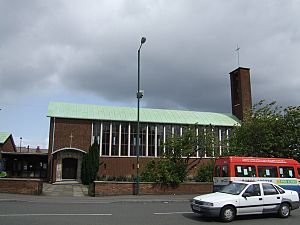All Saints' Church, Darlaston facts for kids
Quick facts for kids All Saints’ Church, Darlaston |
|
|---|---|

All Saints’ Church, Darlaston
|
|
| 52°34′10.1″N 2°1′34.39″W / 52.569472°N 2.0262194°W | |
| Location | Darlaston |
| Country | England |
| Denomination | Church of England |
| History | |
| Dedication | All Saints |
| Consecrated | 1952 |
| Architecture | |
| Heritage designation | Grade II |
| Designated | 22 February 2016 |
| Architect(s) | Richard Twentyman |
| Groundbreaking | 1951 |
| Completed | 1952 |
| Specifications | |
| Length | 120 feet (37 m) |
| Width | 45 feet (14 m) |
| Height | 56 feet (17 m) |
| Administration | |
| Parish | All Saints Darlaston |
| Deanery | Wednesbury |
| Archdeaconry | Walsall |
| Diocese | Diocese of Lichfield |
Welcome to All Saints’ Church in Darlaston! This special building is a parish church that belongs to the Church of England. You can find it in the West Midlands County of England.
Contents
A Look Back: The Church's History
The First Church Building
The very first church building on this spot was completed in 1872. It was designed by an architect named George Edmund Street. This church was built to remember a person named Samuel Mills. It had beautiful stained glass windows, which were designed by Edward Burne-Jones. Sadly, this first church was destroyed by a bomb during the Second World War on July 31, 1942.
Building the New Church
After the old church was destroyed, work began on a new one in 1951. The new church was designed by architect Richard Twentyman. It was officially opened and blessed on October 4, 1952, by the Bishop of Lichfield.
Key Features of the New Church
The church tower stands tall at about 56 feet (17 meters) high. It holds two bells inside. The main part of the church is quite large, measuring about 120 feet (37 meters) long and 45 feet (14 meters) wide.
At the east end of the church, you'll see a large, colorful tapestry. This tapestry was designed by an artist named Stephen Lee. Also, the main entrance doors have cool stone carvings, which were created by Don Potter.
A Special Building: Grade II Listed
All Saints’ Church is considered a very important building. On February 22, 2016, Historic England gave it a special status called "Grade II". This means it's a building of national importance and needs to be protected.
The Church Organ
Inside the church, there is a large pipe organ. This organ was made by a company called John Compton. If you are interested in organs, you can find more details about this specific one on the National Pipe Organ Register.
 | Janet Taylor Pickett |
 | Synthia Saint James |
 | Howardena Pindell |
 | Faith Ringgold |

